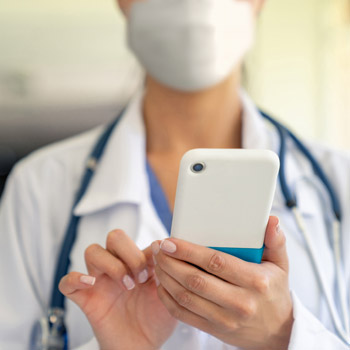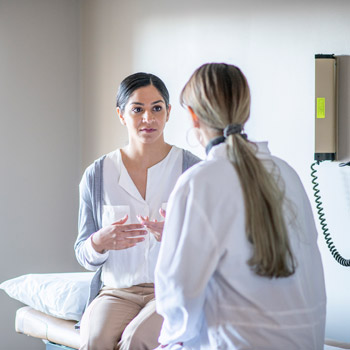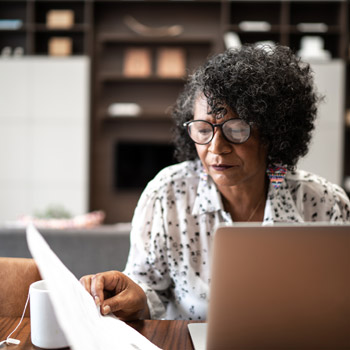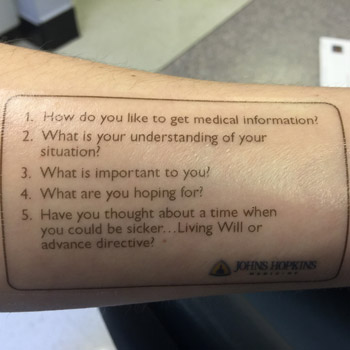An app for delirium
Delirium screening using the app took about a minute and was almost 90% effective among elderly inpatients.
Where: Beth Israel Deaconess Medical Center, a 719-bed academic medical center in Boston, and Mount Nittany Medical Center, a 260-bed community teaching hospital in State College, Pa.
The issue: Identifying delirium in medical inpatients.
Background
ACP Member Edward R. Marcantonio, MD, and other researchers have repeatedly found delirium to be under-recognized among hospital patients. “Only about a third to a half of all cases are identified in routine clinical care,” said Dr. Marcantonio, a professor of medicine at Harvard Medical School in Boston.

They've also identified tools that can be used to diagnose delirium relatively rapidly, such as the three-minute Diagnostic interview for the Confusion Assessment Method (3D-CAM). “That's a three-minute structured delirium assessment that clinicians can do, and that's gained a fair amount of popularity. But we've got feedback that even three minutes could be too long for the assessment of delirium,” he said. “If you're taking care of 10 or 15 patients, that's half an hour to 45 minutes.”
A team of researchers—Dr. Marcantonio, co-study lead Donna M. Fick, RN, PhD, and colleagues—decided to try to make screening even faster and easier.
How it works
First, they narrowed the screening questions, so that the first step is to ask a patient only the two most sensitive items in the 3D-CAM: reciting the months of the year backwards and stating the day of the week. “If both of those are correct, you're done; delirium is ruled out,” said Dr. Marcantonio. If a question is incorrect, the screening process moves on to the rest of the 3D-CAM.
They also harnessed the power of computing by putting the questions in an app. “This is exactly what computers are meant to do,” he said. “The app keeps track of exactly what questions have been asked, what the responses are, and what the next question is, to facilitate the briefest interactive testing possible.” The app skips any unnecessary questions; for example, if a patient has already failed to recite the months backwards, it won't test attention further.
To evaluate the app, hospitalists, nurses, and nursing assistants on hospital medicine services at Beth Israel Deaconess Medical Center and Mount Nittany Medical Center began using it on their elderly patients.
Results
In the study, the app was used with 527 general medicine inpatients (mean age, 80 years; 35% with pre-existing dementia) by 399 clinicians for two days each. Results were compared to a reference standard delirium assessment performed by the researchers. The screening was found to be almost 90% accurate and took about a minute, according to results published in the January Annals of Internal Medicine.
“All three disciplines were able to perform the assessments equally well—and that was a bit of a surprise,” said Dr. Marcantonio. He noted that nursing assistants not only successfully screened their patients using what the researchers termed a “mental status vital sign,” but they also reported enjoying the task. When patients failed the initial screen and required additional questioning to diagnose delirium, either a physician or a nurse took over screening.
Challenges
The largest challenge in implementation has been staff turnover, according to Dr. Marcantonio. “Our original plan was to train up the staff at our participating hospitals and then go ahead,” he said. “While we did just that, we also ended up doing a fair amount of customized one-to-one training of new staff as they came on, to just orient them to the app and the procedures.”
Next steps
The app is now available for anyone with an iOS device to download, but its designers are still working to improve it. “The best thing would be to have an app that is linked to the electronic medical record, so that even as you're entering the results, the assessment is documented along with the presence or absence of delirium, and then that would potentially trigger additional steps,” said Dr. Marcantonio.
It would also be helpful for the app to compare new results to those of previous days for the same patient, a feature that the research project included, but the free app does not, he said. “There's still a lot of work to be done … but we felt it was important enough to get the app out there for clinical use.” Dr. Marcantonio added that the researchers are eager to get feedback through the app from clinicians who try it.
Words of wisdom
“Obviously, identifying delirium is just the first step,” Dr. Marcantonio said. Once that hurdle is overcome, there's much more for clinicians to do, he noted. “Try to figure out why they're delirious, try to correct any contributing factors that can be changed, and then manage the patient to try to help them recover as quickly as possible and not cause any additional problems.”





